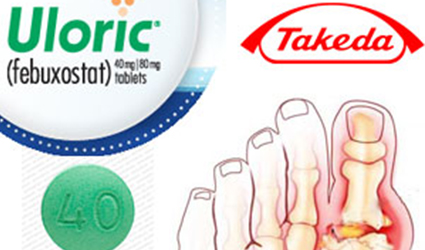Re-Investigation on FDA Approved Anti-Gout Drug Uloric
June 25, 2018
Source: FiercePharma
 955
955

Uloric (febuxostat) is an anti-gout drug discovered by Japanese pharma company Takeda. When the FDA approved this drug, there was an additional demand from the FDA to conduct post-marketing studies and assess the drug’s safety. Recently, a non-profit consumer advocacy group sent a petition requesting that the FDA should eliminate the drug from the U.S. pharma market since the drug shows significant risk of cardiovascular diseases.
The Japanese pharma submitted post-marketing cardiovascular safety results as required by the FDA’s request. A Takeda spokesperson said, “It is working with the agency to conduct a comprehensive review of this data and will update the public with any new information.”
Though Uloric was approved to treat hyperuricemia in 2009, it had two failed attempts in 2005 and 2006 under TAP Pharmaceutical due to increased cardiovascular risks. After accumulating data from all three clinical phases and two long-term extension studies, the FDA couldn’t approve the drug confidently. This led to a warning to further examine its cardiovascular safety profile during approval.
Following the petition, Takeda said that the reason behind the cardiovascular imbalances is still unknown.
Michael Carome, M.D., director of Public Citizen’s Health Research Group said, “The agency should have demanded that an appropriately designed clinical trial to assess febuxostat’s cardiovascular risks be conducted before, not after approval; The FDA almost certainly would have denied approval of febuxostat if data from this post-market trial had been available at the time of the initial submission.”
The organization also argued that there was not sufficient data to show that Uloric prevents gout flares more effectively. The drug just lowers serum uric acid levels that might lead to acute painful gout episodes.
By DduRead more on
- 【EXPERT Q&A】Is it mandatory to conduct clinical trials for drug registration in India? August 9, 2023
- Experimental Ebola Vaccines used During Ebola Outbreak in Congo August 14, 2018
- Hemophilia A Gene Therapy by Spark Therapeutics Needs Phase 3 Trial August 9, 2018
- GE Healthcare Launches Phase III Trial for Using Flurpiridaz 18F Injection to Detect CAD August 6, 2018
- Avatrombopag Reduced Procedure-Related Transfusions in Thrombocytopenia, Chronic Liver Disease Patients August 3, 2018
your submission has already been received.
OK
Subscribe
Please enter a valid Email address!
Submit
The most relevant industry news & insight will be sent to you every two weeks.



